Home | Front Page | Blog | Index | New | Contact | Site Map
2002
Fiction
History
Guides - Med
Guides- Euro
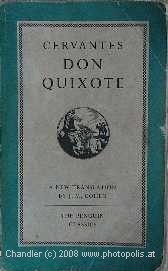 |
Don Quixote
by
Miguel Cervantes, 1600??
Translated by J. M. Cohen We have to confess that it was a chore getting through this long, 950 page book. But a chore that we recommend. The book is really two books, written about 15 years apart. After the great success of his first volume Cervantes wrote a second, which may as well have been called "Sancho Panza", so much does it focus on Don Quixote's squire. If Cervantes had changed the name he would have anticipated Samuel Clemens, who followed "Tom Sawyer" with a focus on a minor character, "Huckleberry Finn" Volume I is an adventure, a slapstick story. Over and over Don Quixote tilts at windmills, mistakes inns for enchanted castles, and thinks that sheep, herds of cattle, etc are attacking knights or dragons. Some of this happens in Volume II, but much of it is given to Sancho Panza's aphorisms and to Don Quixote's (really Cervantes') spouting and moralizing. As the pages turn one gets a good idea of the food, dress, and mores of people in Spain in the early 1600s. One even gets a whiff of the politics of the day — was the inquisition a good idea? Should there be religious freedom? What rights should women have and how should marriages be arranged? If you are like Jan you'll like Volume I better and be bored with Volume II. If like Gerry, it will be the opposite. In either case, this is not a book to read in one go; unlike a murder mystery, after 20-30 pages you'll want to rest and come back later. It's the Simpsons.
|
|
|
The
Four-Gated City by Doris Lessing
Having just read Lessing's autobiography, the novel's early plot was sometimes too repetitious of Lessing's real life. And yet, the characters, although clearly based on Lessing's own acquaintances and friends, were not believable (in particular the man called Jack) and the descent at the end of the book into science fiction didn't gel with the rest of the book— it almost seemed as if Lessing had no good idea of how to end the book. It is set in post-war London and covers the social, sexual, and political mores of the period as experienced by a young woman immigrant from southern Africa.
Not Recommended
|
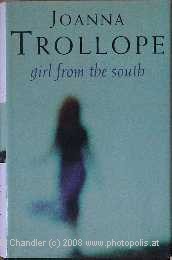 |
Girl
From the South by Joanna Trollope
This is a favorite author of Jan's but the book is one of Trollope's weaker efforts. We started reading her about five years ago and really liked A Village Affair and The Men and the Girls, both entirely set in England. This one is unusual as far as we know, as it jumps back and forth between Charleston and London. Having just visited Charleston in December, 2001, we understood many of the references that we would have otherwise missed. The story concerns lovers in the 20-30 age range trying to sort out who they are and who they want as a partner.
Mixed feelings
|
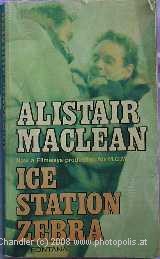 |
Ice
Station Zebra by Alistair Maclean, 1963
Another great 10p bargain from the Selby Abbey books table. A great classic adventure story with only minimum holes in the yarn, it kept both of us glued to its pages for the day or so it took to read it.
Highly recommended.
|
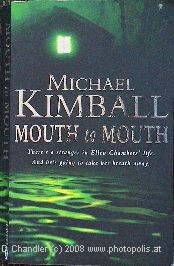 |
Mouth
to Mouth by Michael Kimball
Jan picked this book up at an oddments table outside of a shop in Hampstead, London, just after we attended Dinah and Mick's Wedding and Retirement Bash. She was surprised to quite enjoy it as she doesn't usually go for this kind of suspense thriller. It's a very light read and took her only a couple of days to devour.
Recommended.
|
|
|
Nicholas
Nickleby by Charles Dickens
Not as good as Bleak House which we read last year, but a pleasant read nonetheless. Gerry didn't manage to read it before the exigencies of baggage weight forced us to abandon it.
Recommended.
|
|
|
The Search
by
C.P.
Snow
Again not as interesting as other works of his we have read. It was a very early novel and it shows, but it is interesting anyway because it is more than a little autobiographical.
Recommended.
|
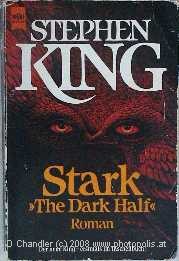 |
Stark
(The Dark Half) by Stephen King
Although definitely not a Stephen King fan, whose supernatural leanings seem simply stupid, Jan picked up this German-language version of one of his novels simply for the exercise of reading German again. She was confirmed in her dislike of King's subject matter, but persevered for the benefit of her language skills. Gerry tried it but didn't finish it; the German is too hard for him.
Definitely not recommended.
|
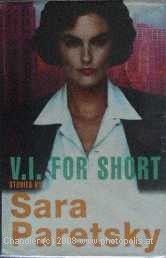 |
V.
I.
For Short by Sara Paretsky
Gerry was desperate (not really) to get Jan a birthday gift so he was pleased when he found this on sale at the Darlington Library. Neither of us read much recent fiction and so without the low price incentive we may not have tried it. "V.I." is a woman detective working in Chicago. She's rather brassy. The book is a collection of five fast-paced stories about cases she solves. The author herself has a PhD in History and MBA from Chicago; she says that the stories are definitely not based on her life. A big plus for her (in the opinion of one of us) is that she is married to a physicist, also retired.
Recommended.
|
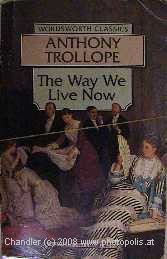 |
The
Way We Live Now by Anthony Trollope, 1875
Jan found this on our Darlington shelf before we left for Egypt in January 2002. It obviously had been bought much earlier, before the book was adapted for television, and neither of us had managed to catch any of the TV series. Jan was happy about that as she much prefers to read the book before the movie/TV version. The book was absolutely brilliant. A masterpiece even by Trollope standards: The almost evil, but nonetheless strangely sympathetic character of Melmotte; the wonderfully deft handling of the almost-engagement of Lady Georgiana to Mr. Brehgert, the Jewish banker; all demonstrate a clear understanding of anti-semitism in British society. Read on only if you aren't planning to read the book! Jan thinks Hetty Carbury should have accepted her Uncle Roger's offer of marriage instead of taking the weak Paul Montague and Montague should have known when he was well off and married the American woman he jilted in favor of Hetty. On the other hand, she was delighted when Lady Carbury finally accepted the second offer of marriage from her friend Mr Brown(?). She deserved a companion for her later years. Such funny, insightful writing from Trollope. Ranks up there with Middlemarch and A House for Mr Biswas in Jan's favorite books list.
Very highly recommended.
|
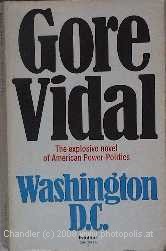 |
Washington,
DC by Gore Vidal, 1987
The story takes place in Washington, DC from about 1937 to 1954 or 1955. We get to see a fictional cast of characters, headed by Senator James Burden Day, wanabee senator Clay Overbury, a high powered newspaper editor, and a flighty — or is he — young playboy deal of the New Deal, Roosevelt, WWII, and McCarthy and the hunt for communists. In addition we get some views on bombing Hiroshima, treatment of homosexuals, and whether politics makes any difference. The story grabs you, it flows along, and you read it quickly.
Recommended.
|